![]()
Fall 2014 | The Middle East Quarterly, Volume 21 – Number 4 | by Efraim Inbar
First published by the Middle East Forum.
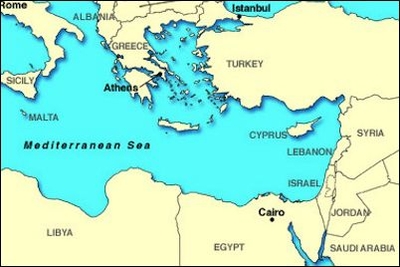
About 90 percent of Israel’s foreign trade is carried out via the Mediterranean Sea. The East Mediterranean is also important in terms of energy transit. Close to 5 percent of global oil supply and 15 percent of global liquefied natural gas travels via the Suez Canal while Turkey hosts close to 6 percent of the global oil trade via the Bosporus Straits and two international pipelines.
About 90 percent of Israel’s foreign trade is carried out via the Mediterranean Sea, making freedom of navigation in this area critical for the Jewish state’s economic well-being. Moreover, the newly found gas fields offshore could transform Israel into an energy independent country and a significant exporter of gas, yet these developments are tied to its ability to secure free maritime passage and to defend the discovered hydrocarbon fields. While the recent regional turmoil has improved Israel’s strategic environment by weakening its Arab foes, the East Mediterranean has become more problematic due to an increased Russian presence, Turkish activism, the potential for more terrorism and conflict over energy, and the advent of a Cypriot-Greek-Israeli axis. The erosion of the state order around the Mediterranean also brings to the fore Islamist forces with a clear anti-Western agenda, thus adding a civilizational dimension to the discord.[1]
The East Mediterranean Region
The East Mediterranean is located east of the 20o meridian and includes the littoral states of Greece, Turkey, Syria, Lebanon, Israel, Gaza (a de facto independent political unit), Egypt, Libya, and divided Cyprus. The region, which saw significant superpower competition during the Cold War, still has strategic significance. Indeed, the East Mediterranean is an arena from which it is possible to project force into the Middle East. Important East-West routes such as the Silk Road and the Suez Canal (the avenue to the Persian Gulf and India) are situated there. In addition, the sources for important international issues such as radical Islam, international terrorism and nuclear proliferation are embedded in its regional politics.
The East Mediterranean is also important in terms of energy transit. Close to 5 percent of global oil supply and 15 percent of global liquefied natural gas travels via the Suez Canal while Turkey hosts close to 6 percent of the global oil trade via the Bosporus Straits and two international pipelines. The discovery of new oil and gas deposits off the coasts of Israel, Gaza, and Cyprus and potential for additional discoveries off Syria and Lebanon, is a promising energy development.
Breakdown of the U.S. Security Architecture
The naval presence of the U.S. Sixth Fleet was unrivalled in the post-Cold War period, and Washington maintained military and political dominance in the East Mediterranean.[2] Washington also managed the region through a web of alliances with regional powers. Most prominent were two trilateral relationships, which had their origins in the Cold War: U.S.-Turkey-Israel and U.S.-Egypt-Israel.[3] This security architecture has broken down.
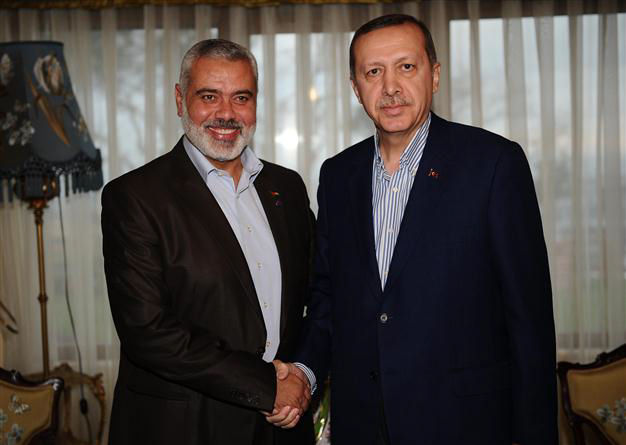
Hamas leader Ismail Haniya (left) meets with Turkish president Recep Tayyip Erdoğan. With the Islamist Erdoğan at its helm, Turkey supports Hamas, a Muslim Brotherhood offshoot; helps Iran evade sanctions; assists Sunni Islamists moving into Syria; propagates anti-U.S. and anti-Semitic conspiracies while, at home, the regime displays increasing authoritarianism.
In the post-Cold War era, Ankara entered into a strategic partnership with Jerusalem, encouraged by Washington.[4] The fact that the two strongest allies of the United States in the East Mediterranean cooperated closely on strategic and military issues was highly significant for U.S. interests in the region. Yet, the rise of the Islamist Justice and Development Party (Adalet ve Kalkınma Partisi, AKP) since its electoral victory of November 2002 has led to a reorientation in Turkish foreign policy which, under the AKP, has distanced itself from the West and developed ambitions to lead the Muslim world.[5] With Recep Tayyip Erdoğan at its helm, Turkey supports Hamas, a Muslim Brotherhood offshoot; helps Iran evade sanctions; assists Sunni Islamists moving into Syria and mulls an invasion of Syria; propagates anti-U.S. and anti-Semitic conspiracies while the regime displays increasing authoritarianism at home. Moreover, Turkey’s NATO partnership has become problematic, particularly after a Chinese firm was contracted to build a long-range air and anti-missile defense architecture.[6]
Turkish policy, fueled by Ottoman and Islamist impulses, has led to an activist approach toward the Middle East and also to strains in the relationship with Israel. This became evident following the May 2010 attempt by a Turkish vessel, the Mavi Marmara, to break the Israeli naval blockade of Gaza. In October 2010, Turkey’s national security council even identified Israel as one of the country’s main threats in its official policy document, the “Red Book.” These developments fractured one of the foundations upon which U.S. policy has rested in the East Mediterranean.
Stability in the East Mediterranean also benefited from the U.S.-Egyptian-Israeli triangle, which began when President Anwar Sadat decided in the 1970s to switch to a pro-U.S. orientation and subsequently to make peace with Israel in 1979. Egypt, the largest Arab state, carries much weight in the East Mediterranean, the Middle East, and Africa. Sadat’s successor, Husni Mubarak, continued the pro-U.S. stance during the post-Cold War era. The convergence of interests among the United States, Egypt, and Israel served among other things to maintain the Pax Americana in the East Mediterranean.
Yet, the U.S.-Egyptian-Israeli relationship has been under strain since Mubarak’s resignation in February 2011. Egypt’s military continued its cooperation with Israel to maintain the military clauses of the 1979 peace treaty. But the Muslim Brother-hood, which came to power via the ballot box, was very reserved toward relations with Israel, which the Brotherhood saw as a theological aberration. Moreover, the Brotherhood basically held anti-U.S. sentiments, which were muted somewhat by realpolitik requirements, primarily the unexpected support lent it by the Obama administration.[7]
The Egyptian army’s removal of the Muslim Brotherhood regime in July 2013 further undermined the trilateral relationship since the U.S. administration regarded the move as an “undemocratic” development. Washington even partially suspended its assistance to Egypt in October 2013, causing additional strain in relations with Cairo. This came on the heels of President Obama’s cancellation of the Bright Star joint military exercise and the Pentagon’s withholding of delivery of weapon systems. The U.S. aid flow has now been tied to “credible progress toward an inclusive, democratically-elected, civilian government through free and fair elections.”[8] Israeli diplomatic efforts to convince Washington not to act on its democratic, missionary zeal were only partially successful.[9] These developments have hampered potential for useful cooperation between Cairo, Jerusalem, and Washington.
The turbulence in the Arab world since 2011 has also underscored the erosion in the U.S. position. This is partly due to the foreign policy of the Obama administration that can be characterized as a deliberate, “multilateral retrenchment … designed to curtail the United States’ overseas commitments, restore its standing in the world, and shift burdens onto global partners.”[10] It is also partly due to Washington’s confused, contradictory, and inconsistent responses to the unfolding events of the Arab uprisings.[11] Furthermore, the ill-conceived pledge of military action in Syria in response to the use of chemical weapons by Assad and the subsequent political acrobatics to avoid following through elicited much ridicule.[12]
This was followed by the November 2013 nuclear deal, hammered out between U.S.-led P5+1 group and Iran, that allows the Islamic Republic to continue enriching uranium as well as weaponization and missiles—the delivery systems—that has been viewed in the East Mediterranean (and elsewhere) as a great diplomatic victory for Tehran. Regional leaders have seen Washington retreat from Iraq and Afghanistan, engage (or appease) its enemies Iran and Syria, and desert friendly rulers. All have strengthened the general perception of a weak and confused U.S. foreign policy.
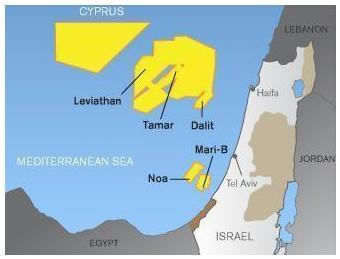
North of Israel, along the Mediterranean coast, sits Lebanon, a state dominated by the radical Shiite Hezbollah. Beirut has already laid claim to some of the Israeli-found offshore gas fields, shown above. Moreover, Syria, an enemy of Israel and long-time ally of Iran, exerts considerable influence in Lebanon.
Drained by the wars in Afghanistan and Iraq and blessed with new energy finds, Washington does not want to get dragged into additional conflicts in a Middle East that no longer seems central to its interests. As it edges toward energy independence, Washington is apparently losing interest in the East Mediterranean and the adjacent Middle East. This parallels Obama’s November 2011 announcement of the “rebalance to Asia” policy.[13] The rise of China is an understandable strategic reason for the reinforcement of U.S. military presence in Asia. While little has been done to implement the Asia pivot, cuts in the U.S. defense budget clearly indicate that such a priority will be at the expense of Washington’s presence elsewhere, including the East Mediterranean. The U.S. naval presence in the Mediterranean dwindled after the end of the Cold War and the mounting needs of the wars in Iraq and Afghanistan.[14] At the height of the Cold War, the Sixth Fleet regularly comprised one or two aircraft carrier task forces; today it consists of a command ship and smaller vessels such as destroyers. While the U.S. military is still capable of acting in the East Mediterranean, the general perception in the region is that the Obama administration lacks the political will and skills to do so.
The possibility that European allies in NATO or the European Union will fill the U.S. position in the East Mediterranean is not taken seriously. Europe is not a real strategic actor since it lacks the necessary military assets, a clear strategic vision, as well as the political will to take up the U.S. role. Others, such as Russia, which has long maintained a base in Syria, might.
Growing Islamist Presence
Elements of radical Islam are increasingly powerful around the East Mediterranean basin. The Muslim-majority countries have difficulties in sustaining statist structures, allowing for Islamist political forces to exercise ever-greater influence. Indeed, Islamist tendencies in Libya, Egypt, Gaza, Lebanon, Syria, and Turkey all threaten the current unrestricted access to the area by Israel and the West.
Libya remains chaotic three years after the uprising against Mu’ammar al-Qaddafi. Such lack of order may lead to the disintegration of the state and allow greater freedom of action for Muslim extremists.[15] Libya’s eastern neighbor, Egypt, is now ruled again by the military, but it is premature to conclude that the Islamist elements will play only a secondary role in the emerging political system. They still send multitudes into the streets of Egyptian cities to destabilize the new military regime. Apart from the important Mediterranean ports, Egypt also controls the Suez Canal, a critical passageway linking Europe to the Persian Gulf and the Far East that could fall into the hands of Islamists.
Even if the Egyptian military is able to curtail the Islamist forces at home, its grip over the Sinai Peninsula is tenuous. Under Gen. Abdel Fattah al-Sisi, attempts to dislodge the Sunni jihadists roaming Sinai have increased, but full Egyptian sovereignty has not been restored. This could lead to the “Somalization” of the peninsula, negatively affecting the safety of naval trade along the Mediterranean, the approaches to the Suez Canal, and the Red Sea. Nearby Gaza is currently controlled by Hamas, a radical Islamist organization allied with Iran. Containment of the Islamist threat from Gaza remains a serious challenge.
North of Israel, along the Mediterranean coast, sits Lebanon, a state dominated by the radical Shiite Hezbollah. It has already laid claim to some of the Israeli-found offshore gas fields. Moreover, Syria, an enemy of Israel and long-time ally of Iran, exerts considerable influence in Lebanon. The Assad regime remains in power, but any Syrian successor regime could be Islamist and anti-Western.
Further on the East Mediterranean coastline is AKP-ruled Turkey. A combination of Turkish nationalism, neo-Ottoman nostalgia, and Islamist-jihadist impulses has pushed Ankara away from a pro-Western foreign orientation toward an aggressive posture on several regional issues. Turkey is interested in gaining control over the maritime gas fields in the eastern Mediterranean, which would limit its energy dependence on Russia and Iran and help fulfill its ambitions to serve as an energy bridge to the West. This puts Ankara at loggerheads with Nicosia and Jerusalem, which share an interest in developing the hydrocarbon fields in their exclusive economic zones and exporting gas to energy-thirsty Europe. Indeed, Ankara also flexed its naval muscles by threatening to escort flotillas trying to break the Israeli blockade on Gaza.
West of Turkey is Greece, a democratic, Western state with a stake in the protection of the Greek Cypriots from Muslim domination. However, it has limited military ability to parry the Turkish challenge alone and is wracked by economic problems. Many East Mediterranean states also would likely favor the return of Cyprus to Turkish (and Muslim) rule. This preference introduces a civilizational aspect to the emerging balance of power.
A New Strategic Equation
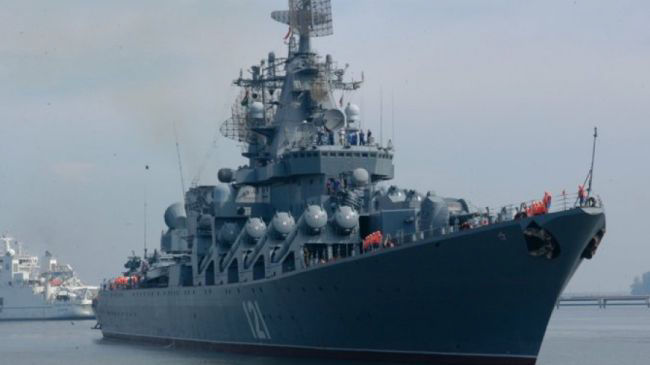
Russian warships arrive at the Syrian port city of Tartus, January 8, 2014. The Russians have retained a naval base at Tartus and have gradually increased fleet size and stepped up patrols in the East Mediterranean, roughly coinciding with the escalation of the Syrian civil war. Moscow also gained full access to a Cypriot port and recently announced the establishment of a Mediterranean naval task force “on a permanent basis.”
There is now a power vacuum in the East Mediterranean and an uncertain future. Several developments are noteworthy: a resurgence of Russian influence, the potential for Turkish aggression, the emergence of an Israeli-Greek-Cypriot axis, an enhanced terrorist threat, greater Iranian ability to project power in the region, and the potential for wars over gas fields.
Russia: The power vacuum makes it easier for Moscow to recapture some of its lost influence after the end of the Cold War. While U.S. and European navies in the region have steadily declined for years as this theater has been considered of diminishing importance, Russia has retained its Tartus naval base on the Syrian coast and has gradually improved its fleet size and stepped up patrols in the East Mediterranean, roughly coinciding with the escalation of the Syrian civil war.[16] Moscow’s new military footprint in the East Mediterranean has been underscored by multiple Russian naval exercises. During his visit to the Black Sea Fleet in February 2013, Defense Minister Sergei Shoigu stressed that the “Mediterranean region was the core of all essential dangers to Russia’s national interests” and that continued fallout from the Arab upheavals increased the importance of the region. Shortly after, he announced the establishment of a naval task force in the Mediterranean “on a permanent basis.”[17]
Moscow also gained full access to a Cypriot port.[18] A member of the European Union but not NATO, and painfully aware that the West is not likely to offer a credible guarantee against potential Turkish aggression, Nicosia has come to consider Moscow a power able to provide a modicum of deterrence against Ankara.[19]
Russian diplomacy and material support have also been crucial to keeping Syria’s Bashar al-Assad in power, making Moscow a tacit ally of Iran.[20] No less important, Russia has increased its leverage in Egypt—the most important Arab state—following the military coup. According to many reports, a large arms deal, to the tune of U.S. $2-3 billion, and naval services at the port of Alexandria, were discussed between the two countries at the beginning of 2014. If these deals do indeed materialize, this would represent an important change in Egyptian policy. It is not clear whether the Western powers fully understand the strategic significance of Egypt moving closer to Russia.
Despite its problems with Muslim radicals at home, Moscow has also maintained good relations with Hamas. In contrast to most of the international community, which considers Hamas a terrorist organization, in 2006, the Russian government invited a Hamas delegation to Moscow for talks.[21] In 2010, together with Turkey, Russia even called for bringing Hamas into the diplomatic process attempting to achieve an Israeli-Palestinian agreement.[22]
Finally, Russia—an energy producer—has shown interest in the newly discovered offshore energy fields.[23] In July 2012, Russian president Vladimir Putin visited Israel to discuss the gas fields, among other things. In December 2013, Moscow signed a 25-year energy deal with Syria that opens the way for its eventual move into the gas-rich East Mediterranean.[24]
Turkey: The Russian encroachment has been paralleled by greater Turkish assertiveness. Under certain conditions, Ankara may be tempted to capitalize on its conventional military superiority to force issues by military action in several arenas, including the Aegean, Cyprus, Syria, and, perhaps, Iraq. The potential disintegration of Syria and the possible establishment of an independent Greater Kurdistan could be incentives for Turkish intervention. The collapse of the AKP’s earlier foreign policy, dubbed “zero problems” with Turkey’s neighbors, could push Ankara into open confrontation. Aggressive Russian behavior in Crimea could reinforce such tendencies.
Similarly, Turkey’s appetite for energy and aspiration to become an energy bridge to Europe could lead to aggressive behavior. Turkish warships have harassed vessels prospecting for oil and gas off Cyprus. [25] Cyprus is also the main station for a Turkish desired pipeline taking Levant Basin gas to Turkey for export to Europe. Ankara might even be tempted to complete its conquest of Cyprus, begun when it invaded and occupied the northern part of the island in 1974.
Ankara has embarked on military modernization and has ambitious procurement plans. Turkish naval power is the largest in the East Mediterranean.[26] In March 2012, then-navy commander Admiral Murat Bilgel outlined Turkey’s strategic objective “to operate not only in the littorals but also on the high seas,” with high seas referring to the East Mediterranean. The December 2013 decision to purchase a large 27,500-ton landing dock vessel capable of transporting multiple tanks, helicopters, and more than a thousand troops, reflects its desire to project naval strength in the region.[27]
Israel, Cyprus, and Greece: Turkey’s threats and actions have brought Israel, Cyprus, and Greece closer together. Beyond blocking a revisionist Turkey and common interests in the area of energy security, the three states also share apprehensions about the East Mediterranean becoming an Islamic lake. Athens, Jerusalem, and Nicosia hope to coordinate the work of their lobbies in Washington to sensitize the U.S. administration to their concerns. Battling an economic crisis, Greece wants the new ties with Israel to boost tourism and investment, particularly in the gas industry, while deepening its military partnership with a powerful country in the region.[28] Moreover, the emerging informal Israeli-Greek alliance has the potential to bring Israel closer to Europe and moderate some of the pro-Palestinian bias occasionally displayed by the European Union.
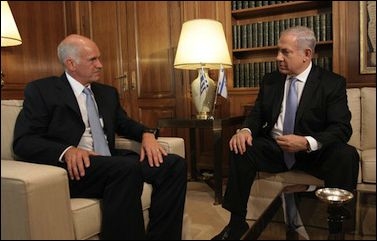
Greece’s George Papandreou (left) and Benjamin Netanyahu in Athens, August 2010. Turkey’s threats and actions have brought Israel and Greece closer together . Battling an economic crisis, Greece wants the new ties with Israel to boost tourism and investment, particularly in the gas industry, while deepening its military partnership with a powerful country in the region.
Following Benjamin Netanyahu’s visit to Greece in August 2010, cooperation between the two countries has been broad and multifaceted, covering culture, tourism, and economics. One area of cooperation discussed was the possibility of creating a gas triangle—Israel-Cyprus-Greece—with Greece the hub of Israeli and Cypriot gas exports to the rest of Europe.[29] Such a development could lessen the continent’s energy dependence on Russia.[30] Another project that can further improve the ties between the countries is a proposed undersea electric power line between Israel, Cyprus, and Greece. Currently Israel and Cyprus are isolated in terms of electricity and do not export or import almost any power.
Israeli-Greek military cooperation has already manifested itself in a series of multinational—Greek, Israel, and United States—joint air and sea exercises under the names Noble Dina[31] and Blue Flag (which included an Italian contingent).[32] Greece also cooperated with Israel in July 2011 by preventing the departure of ships set to sail to Gaza.[33]
International terrorism: Developments in the Arab states of the East Mediterranean have increased the threat of international terrorism. As leaders lose their grip over state territory and borders become more porous, armed groups and terrorists gain greater freedom of action. Moreover, security services that dealt with terrorism have been negatively affected by domestic politics and have lost some of their efficiency. Sinai has turned into a transit route for Iranian weapons to Hamas and a base for terrorist attacks against Israel. Hamas has even set up rocket production lines in Sinai in an effort to protect its assets, believing Jerusalem would not strike targets inside Egypt for fear of undermining the bilateral relations.[34] Syria has also become a haven for many Islamist groups as result of the civil war.
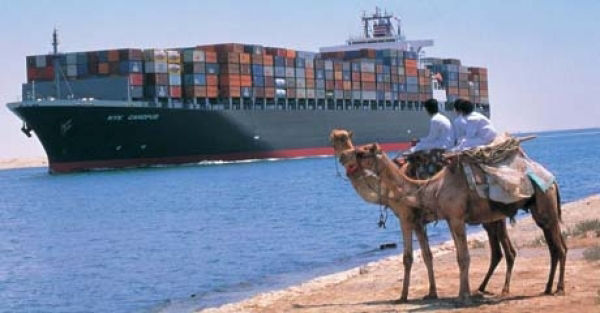
Salafi jihadist groups have reportedly attacked the Suez Canal several times. In 2013, an Egyptian court sentenced 26 members of an alleged terrorist group to death over plans to target ships in the canal. In 2014, Egyptian authorities again tightened security around the canal following fears that Muslim Brotherhood supporters of Mohamed Morsi might attack ships in the waterway in protest over his trial.
Furthermore, as weakened or failed states lose control over their security apparatus, national arsenals of conventional and nonconventional arms have become vulnerable, which may result in the emergence of increasingly well-armed, politically dissatisfied groups seeking to harm Israel. For example, following the fall of Qaddafi, Libyan SA-7 anti-air missiles and anti-tank rocket-propelled grenades reached Hamas in Gaza.[35] Similarly, in the event of a Syrian regime collapse, Damascus’s advanced arsenal, including chemical weapons, shore-to-ship missiles, air defense systems, and ballistic missiles of all types could end up in the hands of Hezbollah or other radical elements.[36]
Finally, terrorist activities could adversely affect the navigation through the Suez Canal, an important choke point. Salafi jihadist groups have attacked the canal several times already.[37]
The Iranian presence: The decline in U.S. power, the timidity of the Europeans, and the turmoil in the Arab world have facilitated Iranian encroachment of the East Mediterranean. Indeed, Tehran’s attempts to boost its naval presence in the Mediterranean are part of an ambitious program to build a navy capable of projecting power far from Iran’s borders.[38] Tehran would like to be able to supply its Mediterranean allies: Syria, Hezbollah in Lebanon, and Hamas in Gaza. Entering the Mediterranean also enhances Iran’s access to Muslim Balkan states, namely Albania, Bosnia, and Kosovo, giving Tehran a clear stake in the outcome of the Syrian civil war. Assad’s hold on power is critical for the “Shiite Crescent” from the Persian Gulf to the Levant, which would enhance Iranian influence in the Middle East and the East Mediterranean. Tehran has also been strengthening naval cooperation with Moscow, viewed as a potential partner in efforts to limit and constrain U.S. influence.[39]
Wars over gas fields: The discovery of gas fields in the East Mediterranean could potentially escalate tensions in this increasingly volatile region. Competing claims to the gas fields by Israel’s former ally Turkey as well as by its neighbor Lebanon (still in a de jure state of war) have precipitated a buildup of naval forces in the Levant basin by a number of states, including Russia. Israel’s wells and the naval presence protecting them also offer new targets at sea to its longstanding, non-state enemies, Hezbollah and Hamas.
Conscious of these threats, the Israel Defense Forces chief of staff, Lt. Gen. Benny Gantz, has approved the navy’s plan to add four offshore patrol vessels.[40] Israeli defense circles hope that Israel’s expanding navy, combined with continuous improvement of land and air assets and increasing cooperation with Greece and Cyprus, will give pause to any regional actor that would consider turning the Mediterranean Sea into the next great field of battle. Indeed, the Israeli navy is now preparing to defend the gas field offshore of Israel.[41]
The future role of Russia in these developments is not clear. Some analysts believe that Moscow is interested primarily in marketing the region’s energy riches. Securing gas reserves in the East Mediterranean will also help Moscow safeguard its dominant position as a natural gas supplier to western Europe, which could be challenged by new competitors in the region. Yet, delays and disruptions in moving gas to Europe might further strengthen Russia’s role as a major energy supplier to Europe and keep prices high, which is beneficial for Moscow. Moreover, as the Ukraine crisis indicated, geopolitics still is a dominant factor in Russian decision-making.
Conclusion
Stability in the East Mediterranean can no longer be taken for granted as U.S. forces are retreating. Europe, an impotent international actor, cannot fill the resulting political vacuum. Russia under Putin is beefing up its naval presence. Growing Islamist freedom of action is threatening the region. Turkey, no longer a true ally of the West, has its own Mediterranean agenda and the military capability to project force to attain its goals. So far, the growing Russian assertiveness has not changed the course of Turkish foreign policy. The disruptive potential of failed states, the access of Iran to Mediterranean waters, and interstate competition for energy resources are also destabilizing the region. But it is not clear whether the Western powers, particularly the United States, are aware of the possibility of losing the eastern part of the Mediterranean Sea to Russia or radical Islam, or are
preparing in any way to forestall such a scenario. U.S. naiveté and European gullibility could become extremely costly in strategic terms.
The Israeli perspective on the East Mediterranean region is colored by its vital need to maintain the freedom of maritime routes for its foreign trade and to provide security for its newly found gas fields. While its strategic position has generally improved in the Middle East, Jerusalem sees deterioration in the environment in the East Mediterranean. A growing Russian presence and Turkish assertiveness are inimical to Israel’s interests. Developments along the shores of the East Mediterranean also decrease stability and enhance the likelihood of more Islamist challenges.
In civilizational terms, the East Mediterranean has served as a point of contention in the past between Persia and the ancient Greeks and between the Ottomans and Venetians. It is the location where the struggle between East and West takes place. After the Cold War, the borders of the West moved eastward. Now, they could easily move in the other direction.
Efraim Inbar, director of the Begin-Sadat (BESA) Center for Strategic Studies, is professor of political studies at Bar-Ilan University and a Shilman-Ginsburg Writing Fellow at the Middle East Forum.
![]()
Notes:
[1] Samuel P. Huntington, “The Clash of Civilizations?” Foreign Affairs, Summer 1993, pp. 22-49.
[2] For more, see Seth Cropsey, Mayday: The Decline of American Naval Supremacy (New York: Overlook Duckworth, 2013).
[3] Jon B. Alterman and Haim Malka, “Shifting Eastern Mediterranean Geometry,” The Washington Quarterly, Summer 2012, pp. 111-25.
[4] Efraim Inbar, The Israeli-Turkish Entente (London: King’s College Mediterranean Program, 2001); Ofra Bengio, The Turkish-Israeli Relationship. Changing Ties of Middle Eastern Outsiders (New York: Palgrave, 2004).
[5] Rajan Menon and S. Enders Wimbush, “The US and Turkey: End of an Alliance?” Survival, Summer 2007, pp. 129-44; Efraim Inbar, “Israeli-Turkish Tensions and Their International Ramifications,” Orbis, Winter 2011, pp. 135-9; Ahmet Davutoğlu, Stratejik Derinlik: Türkiye’nin Uluslararası Konumu (Istanbul: Küre Yayınları, 2001).
[6] Tarik Ozuglu, “Turkey’s Eroding Commitment to NATO: From Identity to Interests,” The Washington Quarterly, Summer 2012, pp. 153-64; Burak Ege Bekdil, “Allies Intensify Pressure on Turkey over China Missile Deal,” The Defense News, Feb. 24, 2014, p. 8.
[7] Liad Porat, “The Muslim Brotherhood and Egypt-Israel Peace,” Mideast Security and Policy Studies, no. 102, BESA Center for Strategic Studies, Ramat Gan, Aug. 1, 2013.
[8] Tally Helfont, “Slashed US Aid to Egypt and the Future of the Bilateral Relations,” Institute for National Strategic Studies, Washington, D.C., Oct. 13, 2013.
[9] Interview with senior Israeli official, Jerusalem, Apr. 7, 2013.
[10] Daniel W. Drezner, “Does Obama Have a Grand Strategy? Why We Need Doctrines in Uncertain Times,” Foreign Affairs, July/Aug. 2011, p. 58.
[11] Eitan Gilboa, “The United States and the Arab Spring,” in Efraim Inbar, ed., The Arab Spring, Democracy and Security: Domestic and Regional Ramifications (London: Routledge, 2013), pp. 51-74.
[12] Eyal Zisser, “The Failure of Washington’s Syria Policy,” Middle East Quarterly, Fall 2013, pp. 59-66.
[13] “Pivot to the Pacific? The Obama Administration’s ‘Rebalancing’ toward Asia,” Congressional Research Service, Washington, D.C., Mar. 28, 2012.
[14] Seth Cropsey, “All Options Are Not on the Table: A Briefing on the US Mediterranean Fleet,” World Affairs Journal, Mar. 16, 2011; Steve Cohen, “America’s Incredible Shrinking Navy,” The Wall Street Journal, Mar. 20, 2014.
[15] Florence Gaub, “A Libyan Recipe for Disaster,” Survival, Feb.-Mar. 2014, pp. 101-20.
[16] Thomas R. Fedyszyn, “The Russian Navy ‘Rebalances’ to the Mediterranean,” U.S. Naval Institute, Annapolis, Dec. 2013.
[17] Ibid.
[18] InCyprus.com, Jan. 11, 2014.
[19] Interviews with senior officials, Nicosia, Oct. 10, 2012.
[20] Zvi Magen, “The Russian Fleet in the Mediterranean: Exercise or Military Operation?” Institute for National Strategic Studies, Washington, D.C., Jan. 29, 2013.
[21] Igor Khrestin and John Elliott, “Russia and the Middle East,” Middle East Quarterly, Winter 2007, pp. 21-7.
[22] The Jerusalem Post, May 12, 2010.
[23] Thane Gustafson, “Putin’s Petroleum Problem,” Foreign Affairs, Nov./Dec. 2012, pp. 83-96.
[24] United Press International, Jan. 16, 2014.
[25] For example, see, Gary Lakes, “Oil, Gas and Energy Security,” European Rim Policy and Investment Council (ERPIC, Larnaca, Cyprus), Oct. 23, 2009.
[26] “Turkey,” Institute for National Strategic Studies, Washington, D.C., Dec. 24, 2012, pp. 19-25.
[27] The Jerusalem Post, Feb. 4, 2014.
[28] Bloomberg News Service (New York), Aug. 2011.
[29] The Jerusalem Post, Sept. 10, 2013.
[30] Ibid., Aug. 2, 2011.
[31] The Times of Israel (Jerusalem), Mar. 25, 2014.
[32] Arutz Sheva (Beit El and Petah Tikva), Nov. 25, 2013.
[33] Haaretz (Tel Aviv), July 2, 2011.
[34] The Jerusalem Post, Dec. 11, 2011.
[35] Reuters, Aug. 29, 2011.
[36] Defense News (Springfield, Va.), Dec. 12, 2011.
[37] USA Today, Nov. 4, 2013.
[38] Shaul Shay, “Iran’s New Strategic Horizons at Sea,” Arutz Sheva, July 30, 2012; Agence France-Presse, Jan. 17, 2013.
[39] Michael Eisenstadt and Alon Paz, “Iran’s Evolving Maritime Presence,” Policy Watch, no. 2224, Washington Institute for Near East Policy, Washington, D.C., Mar. 13, 2014.
[40] Israel Hayom (Tel Aviv), July 10, 2012.
[41] Defense News (Springfield, Va.), Feb. 27, 2012.



 RSS
RSS


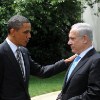







Latest Comments
Hello Mike, Thank you for your positive feedback to the article. I felt there wasn’t too much critical analysis of ...
Thanks for this considered and well constructed article. A follow up article on the manner in which the editorial contro...
THE CLUELESSNESS OF CLAIMING THAT OBAMA'S MIDDLE EAST POLICIES WERE A FAILURE CANNOT BE FURTHER FROM THE TRUTH, WHAT THE...
As long as Obama is the president of the usa do not trust the us government......
Thank you for an good read....